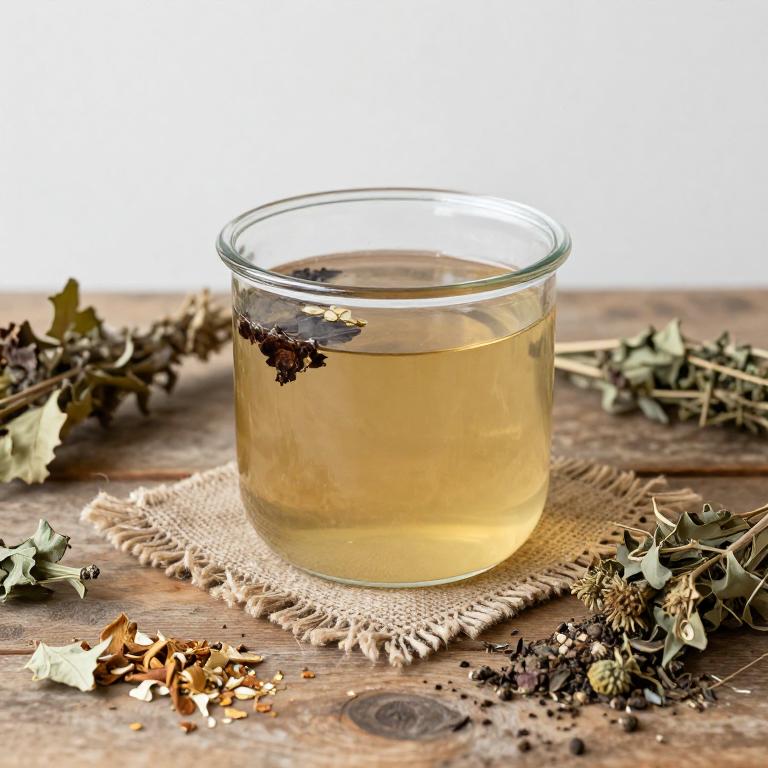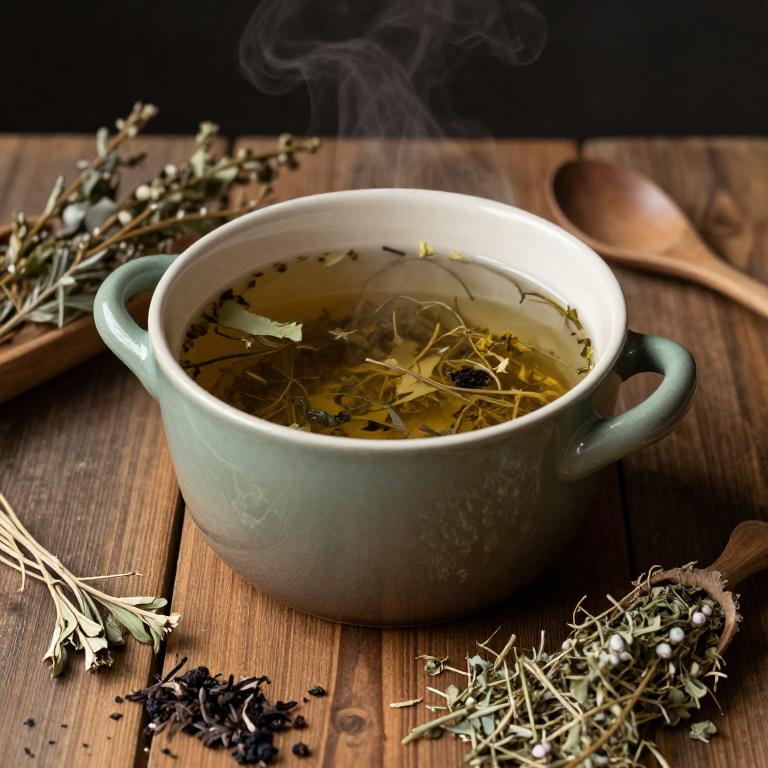10 Best Herbal Decoctions For Bloating

Herbal decoctions have been widely used for centuries to alleviate bloating by promoting digestion and reducing gas buildup in the gastrointestinal tract.
Common herbs such as ginger, fennel, peppermint, and dandelion root are often included in these decoctions due to their natural carminative and anti-inflammatory properties. To prepare a decoction, the herbs are typically boiled in water for an extended period to extract their active compounds, which can then be consumed as a tea or tincture. These natural remedies are generally considered safe for most individuals, though they may interact with certain medications or have contraindications for pregnant women or those with specific health conditions.
Incorporating herbal decoctions into a holistic approach can provide gentle and effective relief from bloating when used consistently and under proper guidance.
Table of Contents
1. Fennel (Foeniculum vulgare)

Foeniculum vulgare, commonly known as fennel, has been traditionally used in herbal medicine to alleviate bloating due to its carminative and antispasmodic properties.
A decoction of fennel seeds is often prepared by simmering them in water for several minutes, allowing the active compounds to dissolve into the liquid. This herbal remedy is believed to help reduce gas buildup and ease digestive discomfort by promoting the release of trapped air in the intestines. It is frequently used in both Western and Ayurvedic traditions for digestive support.
However, individuals with allergies or specific health conditions should consult a healthcare provider before using fennel decoctions.
2. Cumin (Cuminum cyminum)

Cuminum cyminum, commonly known as cumin, has been traditionally used in herbal medicine for its digestive benefits, particularly in alleviating bloating.
When prepared as a decoction, cumin seeds are simmered in water to extract their essential oils and active compounds, which can help reduce gas and improve digestion. The volatile oils in cumin, such as limonene and cuminaldehyde, are believed to stimulate digestive enzymes and relax gastrointestinal muscles, thereby easing discomfort. Herbal decoctions made from cumin are often recommended for individuals experiencing bloating due to indigestion or dietary indiscretion.
Regular consumption of cumin decoctions may support overall digestive health and provide a natural remedy for bloating.
3. Thistle (Silybum marianum)

Silybum marianum, also known as milk thistle, is a herbal remedy that has been traditionally used for its potential benefits in digestive health.
Herbal decoctions of Silybum marianum are often prepared by simmering the dried seeds in water, creating a concentrated tea that may aid in reducing bloating. The active compound, silymarin, is believed to support liver function and may help in the digestion of fats, thereby alleviating gastrointestinal discomfort. Some studies suggest that silymarin can reduce gas and bloating by improving gut motility and reducing inflammation.
However, while anecdotal evidence supports its use, more clinical research is needed to fully confirm its efficacy for bloating relief.
4. Turmeric (Curcuma longa)

Curcuma longa, commonly known as turmeric, has been traditionally used in herbal medicine for its anti-inflammatory and digestive properties.
Herbal decoctions made from the rhizomes of Curcuma longa are often prepared by boiling the dried root in water to extract its active compounds, such as curcumin. These decoctions are believed to aid in reducing bloating by improving gastrointestinal motility and reducing gas formation. The anti-inflammatory effects of curcumin may also help alleviate digestive discomfort associated with bloating.
However, while some studies suggest potential benefits, more clinical research is needed to fully understand its efficacy and optimal usage for this condition.
5. Anise (Pimpinella anisum)

Pimpinella anisum, commonly known as anise, has been traditionally used in herbal medicine for its ability to alleviate bloating and digestive discomfort.
The seeds of anise contain compounds like anethol, which have carminative and antispasmodic properties that help reduce gas and relax the gastrointestinal tract. A decoction made from dried anise seeds can be prepared by simmering them in water for several minutes, allowing the active compounds to infuse into the liquid. This herbal remedy is often used to ease symptoms of indigestion, flatulence, and bloating, making it a popular choice in natural health practices.
When consumed in moderation, anise decoctions can provide gentle relief for digestive issues without causing significant side effects.
6. Peppermint (Mentha piperita)

Mentha piperita, commonly known as peppermint, is widely used in herbal decoctions to alleviate symptoms of bloating.
The essential oils found in peppermint leaves, particularly menthol and piperine, have antispasmodic and carminative properties that help relax the gastrointestinal muscles and reduce gas. When prepared as a herbal decoction, peppermint can soothe the digestive tract and ease discomfort caused by excess gas and distension. This traditional remedy is often consumed as a tea, and its effectiveness is supported by both historical use and modern scientific research.
However, individuals with certain gastrointestinal conditions should consult a healthcare provider before using peppermint decoctions.
7. Ginger (Zingiber officinale)

Zingiber officinale, commonly known as ginger, has been widely used in herbal medicine for its digestive benefits, particularly in alleviating bloating.
Herbal decoctions made from fresh or dried ginger root are often prepared by simmering the rhizome in water to extract its active compounds, such as gingerol and shogaol, which have anti-inflammatory and carminative properties. These decoctions can help reduce gas, ease abdominal discomfort, and promote healthy digestion by stimulating gastrointestinal motility. They are traditionally used in both Eastern and Western herbal practices to address digestive upset and bloating associated with indigestion or dietary indiscretion.
When consumed regularly, ginger decoctions may offer a natural and effective remedy for chronic or occasional bloating.
8. Black pepper (Piper nigrum)

Piper nigrum, commonly known as black pepper, has been traditionally used in herbal medicine for its potential digestive benefits.
Herbal decoctions made from black pepper are believed to aid in reducing bloating by stimulating digestion and promoting the movement of gas through the gastrointestinal tract. The active compound, piperine, may enhance the absorption of other nutrients and support the body's natural digestive processes. When prepared as a decoction, black pepper can be simmered with water and consumed in small amounts to alleviate discomfort caused by gas and indigestion.
However, it is important to consult a healthcare professional before using black pepper decoctions, especially for individuals with sensitive stomachs or existing gastrointestinal conditions.
9. Licorice (Glycyrrhiza glabra)

Glycyrrhiza glabra, commonly known as licorice root, has been traditionally used in herbal medicine for its potential benefits in alleviating bloating.
Herbal decoctions made from licorice root are believed to support digestive health by reducing inflammation in the gastrointestinal tract. The active compounds in licorice, such as glycyrrhizin and flavonoids, may help regulate gut motility and ease gas-related discomfort. However, prolonged use of licorice root decoctions can lead to side effects like hypertension due to its mild corticosteroid-like effects.
As a result, it is advisable to consult a healthcare professional before using licorice root for bloating, especially for individuals with pre-existing health conditions.
10. Dog rose (Rosa canina)

Rosa canina, commonly known as dog rose, has been traditionally used in herbal medicine for its potential digestive benefits.
Herbal decoctions made from the hips of Rosa canina are often prepared by simmering the dried fruit in water for several hours to extract its active compounds. These decoctions are believed to help alleviate bloating by promoting healthy digestion and reducing gastrointestinal discomfort. The herb contains high levels of vitamin C, antioxidants, and anti-inflammatory properties that may support digestive health.
While some studies suggest its efficacy in reducing bloating, it is advisable to consult a healthcare professional before using Rosa canina, especially for individuals with existing medical conditions or those taking medications.